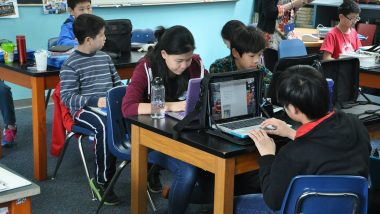Beijing, August 23: In an increasingly competitive educational landscape in China, the concept known as "Neijuan," or involution, has taken root in secondary schools, reshaping academic norms and prompting intense debates among students, educators, and experts. Neijuan challenges the prevailing notion of cutthroat competition in modern workplaces, arguing that such competition yields minimal rewards and counterproductive outcomes.
One prominent manifestation of this concept is the "heads-up rate," a behavioural metric adopted by numerous secondary schools across China. According to multiple reports, this measure assesses students' concentration levels by tracking their responses to unexpected classroom disturbances. However, this practice has ignited fervent discussions due to its stringent implementation and consequences. Students caught looking up during class disruptions face severe penalties, enduring an entire day of standing punishment from dawn till dusk. China Fire Video: Massive Blaze Erupts at Xintiandi Office Building in Tianjin, Viral Clip Shows Black Smoke Covering Skies.
Critics argue that this approach contradicts innate human reflexes, which prompt individuals to pay attention to sudden noises for survival. There have been real-world consequences of this conditioned behaviour, as exemplified by instances like the 2016 arson attack on a secondary school in Shandong province, where students hesitated to flee due to fear of violating the "heads-up rate" rule. The rise of Neijuan coincides with the escalating challenge of youth unemployment in China. Xi Jinping at SCO Summit 2023: China President Warns Against 'Colour Revolutions' and 'New Cold War'.
Graduates are flooding the job market, particularly in fields like sports and education, where demand has significantly decreased over the years. This discrepancy has created a daunting situation, with unemployment among 16 to 24-year-olds reaching record highs. The government's decision to withhold youth unemployment figures further emphasises the gravity of the issue. China's education system grapples with these complexities as prestigious university attendance remains intertwined with future prosperity.
Some schools have adopted military-style precision and strict academic routines, eliminating non-academic activities. Extreme measures like enforcing buzz-cut hairstyles for students and deploying teachers to monitor classes through peepholes underscore the extent of this shift. Despite the challenges, students are beginning to envision a future where the impact of conditioned behaviour can be overcome. The effects of rigorous academic routines are undeniable, leading to feelings of shame and guilt for not constantly studying. Nevertheless, students remain hopeful that these effects can be transcended over time.
In a society where academic excellence is paramount, introducing Neijuan and the "heads-up rate" reflects a broader reevaluation of the methods and consequences of academic rigour. As China's education system navigates the complexities of an evolving job market and societal pressures, students and educators struggle to find a balance between competition and well-being.
(The above story first appeared on LatestLY on Aug 23, 2023 10:40 AM IST. For more news and updates on politics, world, sports, entertainment and lifestyle, log on to our website latestly.com).













 Quickly
Quickly





















